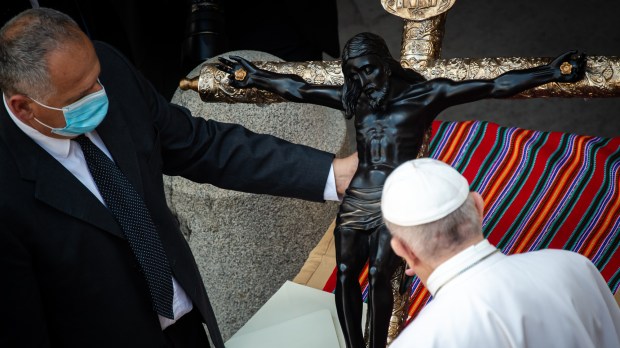Serving Jesus Christ in the needy around us is the most important thing we will do in our lives. But it can also be one of the hardest.
Jesus summed up the commandments as loving God above all else and loving our neighbor as ourselves. We do the first by following God’s will through the teachings of the Church; we do the second through the Works of Mercy, found in Matthew.
Jesus gave us the crucifix to encourage us in both of these great commandments.
Jesus from the cross says: “If I was humble and obedient to the will of the Father, you can be, too.” But he also says, “Whenever you do a work of mercy, you do it for me.” You can see each in the crucifix.
The first work of mercy is “Feed the hungry,” and Jesus himself made this the meaning of his crucifixion.
Jesus set the context for his crucifixion on the night before he died when he broke bread and said, “Take this, all of you, and eat of it: for this is my body which will be given up for you.”
When we see him raised up on the crucifix, we are seeing the fulfillment of those words: Jesus, giving himself as food for the hungry.
The second work of mercy is “Give drink to the thirsty,” and Jesus cries “I thirst!” from the cross.
Though Jesus is dehydrated from the blood, sweat, and tears of his ordeal, the only drink he is offered is vinegar.
To this day, Jesus Christ identifies himself with all those around the world who do not have a clean water source. As he put it: “Whoever gives to one of these little ones even a cup of cold water because he is a disciple, truly, I say to you, he shall not lose his reward.”
The third work of mercy is “Clothe the naked,” and Jesus was naked on the cross.
Jesus was stripped of his clothes and humiliated before the people.
Jesus ever afterword identifies himself with all those who are humiliated in nakedness or who lack the clothes they need, as St. Martin of Tours found out when he shared his cloak with a poor man.
The fourth work of mercy is “Shelter the homeless,” and Jesus died without a home.
Jesus once said “Foxes have holes, and birds of the air have nests; but the Son of man has nowhere to lay his head.”
But from the cross, one of the last things Jesus did was assign a home to his mother as an example for us of how important this work of mercy is.
The fifth work of mercy is “Visit the sick,” and Jesus longed for company in his affliction.
On the night before he died, Jesus said to his friends, “My soul is very sorrowful, even to death; remain here, and watch with me.”
Christians from the very beginning have praised those who stayed with Jesus as he suffered, especially the apostle John, his mother Mary, and St. Mary Magdalene. We can still accompany him in those who are afflicted today.
The sixth work of mercy is “Visit the imprisoned,” and Jesus himself did this from the cross.
Jesus was crucified between two other prisoners, and one was converted by Jesus’ very presence.
Jesus would later tell Paul that he himself was present in the persecuted Christians. To this day Jesus identifies with those imprisoned and we visit him there.
The seventh work of mercy is “Bury the dead,” and Jesus received this service more than once.
Of course, St. Joseph of Arimathea arranged for the burial of Jesus in a new tomb.
But Mary Magdalen and other women also contributed, preparing his body for burial as much as they could before the Sabbath. When they returned a day later to finish the job, they found the stone rolled away and Jesus risen.
From the cross, Jesus says, “Whatever you do, you do it to me.” In his resurrection Jesus meets those who served him in the poor and says, “I will raise you up on the last day.”



